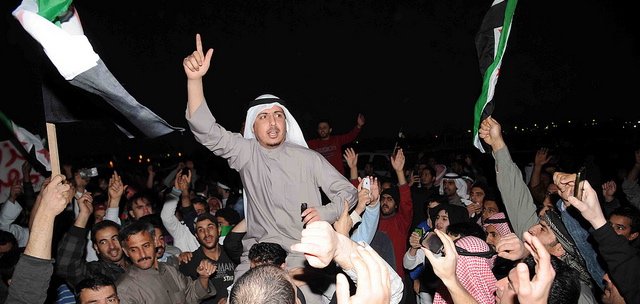A New Round of Political Protests in Kuwait

The detention of a popular Kuwaiti opposition leader may give the opposition movement the impetus it needs to overcome disunity and renew its push for political reform. Meanwhile, in an effort possibly designed to alleviate public grievances, the government has announced a record level of public expenditure.
Background
Thousands of opposition supporters marched in support of opposition leader and former MP, Musallam al- Barrak, on the night of 2 July. The authorities used tear gas and smoke grenades against marchers on the following days. The protesters claim that al-Barrak was subjected to a partial decision by the public prosecutor, who ordered his 10-day detention for allegedly insulting the judiciary at a public rally in June. Al-Barrak has accused former senior officials, including members of the ruling family, of stealing tens of billions of dollars of public funds. At the same time, in an effort possibly designed to stem public grievances, the government has passed a budget that contains record levels of public expenditure.
Comment
Kuwait, widely viewed as the most democratic state in the Gulf, has undergone a prolonged period of political instability since mid-2006. Since then, its parliament has been dissolved six times, but many thought that the period of turbulence was over. In 2012, however, the opposition movement reached its zenith, before falling into the disunity and factionalism that saw its eventual decline. The judiciaryʼs decision against al-Barrak, and his corruption claims, could provide the unifying element that the movement needs. In the 2012 election, the last that he stood for, he received more votes than any politician in the countryʼs history; making him a very popular figure.
Past protests have attempted to make the political system more representative. Under the current system, political parties are banned and the Emir selects the Prime Minister from among his family members. Elected members of parliament have significant powers of legislation and oversight, but they cannot select the members of cabinet, which makes it difficult for them to shape government policy.
In its latest budget, the government has warned of a looming deficit by the end of the decade, due to increased expenditure on public works and the continuation of energy subsidies. The generous welfare system and the lack of income taxes also place significant strain upon the countryʼs coffers. The government also blames the opposition movement and public demonstrations for the slow progress of several government-funded megaprojects.
The latest budget contains a record allowance of 23.2 billion Kuwaiti dinars ($89.3 billion) for government expenditure over the next fiscal year. Total revenue over this period is projected to amount to 20.07 billion dinars ($76.03 billion), leaving the government with a modest deficit.
Due to the use of conservative estimates for oil prices, calculated currently at US$75 per barrel, forward estimates traditionally predict a budget deficit, but each of the last 14 fiscal years have ended with the public treasury in surplus. This fiscal year is unlikely to be any different, making it difficult for the opposition movement to criticise a government that appears intent upon ensuring growth and development.
Protests may yet grow in intensity, even after the release of al-Barrak on 7 July, potentially marking the beginning of a new round of political turbulence. The opposition movement may coalesce around the popular figure of al-Barrak to challenge the ruling al-Sabah family. It may, for example, call for legal political parties and perhaps the formation of a constitutional monarchy, with greater parliamentary involvement in the selection of Cabinet ministers and a prime minister elected by the people.
The current protests do not yet, however, constitute a movement for change. Many Kuwaitis want political reforms, but do not want radical revolution. They wish to see greater accountability, transparency and representation from their political leaders, but do not wish to risk damaging the growth and development of their country in the process. While the authorities are likely to continue to face pressure, it is unlikely that the most recent demonstrations will escalate to the kind of protests seen elsewhere in the Middle East.
Mervyn Piesse is a research assistant Indian Ocean Research Programme.
This article was originally published by Future Directions International. It is republished with permission.


